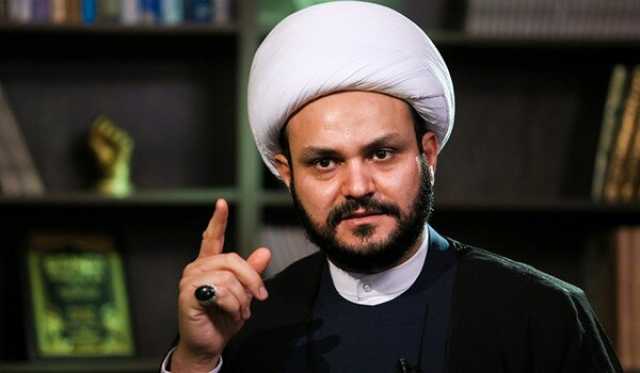Alwaght- The head of Al-Nujaba Movement of Iraq Akram al-Ka'bi says that the US only knows the language of force and that negotiations with Washington will not produce military pull-out from Iraq.
He made the comments in a statement he released on the occasion of Mid-Sha'ban, a religious holiday in Islam that celebrates birthday of the promised Shiite Imam Mahdi, also knows as savior Imam.
He said that the US is too arrogant to be persuaded to end its military presence in Iraq.
He, however, held that Al-Nujaba is not opposed to the government talks with the Americans for a withdrawal timetable, but "the American occupiers are liters, deceivers, and bullies.
He added:" Anyone who thinks that the American invaders will surrender through negotiations and leave Iraq is delusional and the only response for this enemy is force and weapons."
The Iraqi government and the American representatives have been engaged in talks to end the American military presence in the country.
The Iraqi Prime Minister Mohammed Shia al-Sudani in February officially said that the US and the Western coalition are no longer needed in Iraq and that they should leave the country.
He reiterated his intention to end the American presence on Friday.
These comments seem to bring his position on the American military forces on the Iraqi soil closer to those of anti-American militia movements that wanted the US out since 2017, the year Iran's General Qassam Soleimani and his Iraqi allies announced end of ISIS, a terrorist organisation whose invasion of Iraq provided the US with the pretext to return to Iraq militarily after its 2011 withdrawal.
Seeing the Americans defiant to a law of Iraqi parliament for expulsion of the US, the Iraqi resistance forces—now gathering under an umbrella group called Islamic Resistance In Iraq— threatened with an escalation against the American occupation forces.
However, they chose patience, waiting for the government negotiations with the Americans and avoiding embarrassment of the PM.
However, Gaza war drastically changed the game and caused a drive for the Iraqi resistance to strike the bases hosting the US forces that are assisting an Israeli genocidal war on Gaza.
About three weeks ago, the Islamic Resistance in Iraq said it suspended its anti-American operations in expectation of an outcome from the Baghdad-Washington negotiations.
Al-Ka'bi in his statement pointed to the scaled-down operations against the American bases in Iraq and Syria, saying: "The current peace is within the framework of a tactic for resettlement."
He reiterated Iraqi resistance's commitment to Palestinians while operating against the American forces. "The Iraqi Islamic resistance will continue its push to liberate this country and to target Zionist positions in Palestine, and will never stop."
In comments that appeared to provide a cover for the government's diplomatic efforts to expel the American forces, al-Ka'bi noted:"We alone accept consequences [of our operations] and have prepared ourselves for them."
Therefore, the upcoming days will be critical for the government and the Americans themselves to reach a withdrawal deal.
Economic lever
In all these years, the US has utilized economic pressures as a lever to keep Iraqi government away from a withdrawal timetable.
Iraqi government seems to be afraid that the Americans will turn to economic pressurss when they want to reject terms made by Baghdad.
Yesterday, Qatari daily The New Arab in a report shedding light on the matter said the US and Iraq have recently ended two rounds of talks and Iraqi officials are afraid Washington will use economy as a lever.
This Qatari daily held that among these leverages are the money that Baghdad deposits in the American Federal Reserve from the sale of its oil, a procedure that has been implemented since Saddam's invasion of Kuwait in 1990 under the requirements of Chapter VII of the United Nations.
Another American option is adding Iraqi companies and banks to its blacklist. An additional pressure tool is SWIFT system from which Iraq can be disconnected.
Jamal Kujer, an Iraqi member of parliament, says that if these levers are used against Iraq, they will be effective as national economy is fragile and relies 90 percent on oil revenues.
He adds that if the US bans Iraq's large financial transactions in dollars, this step could disrupt financing for the country's economic development, increase Iraq's borrowing costs, and decrease the value of Iraq's national currency.
Still, the White House should reach a point of balance between the Iraqi withdrawal demands and its power to cripple Iraq economically, otherwise, Iraqi resistance will tip the scales.



























